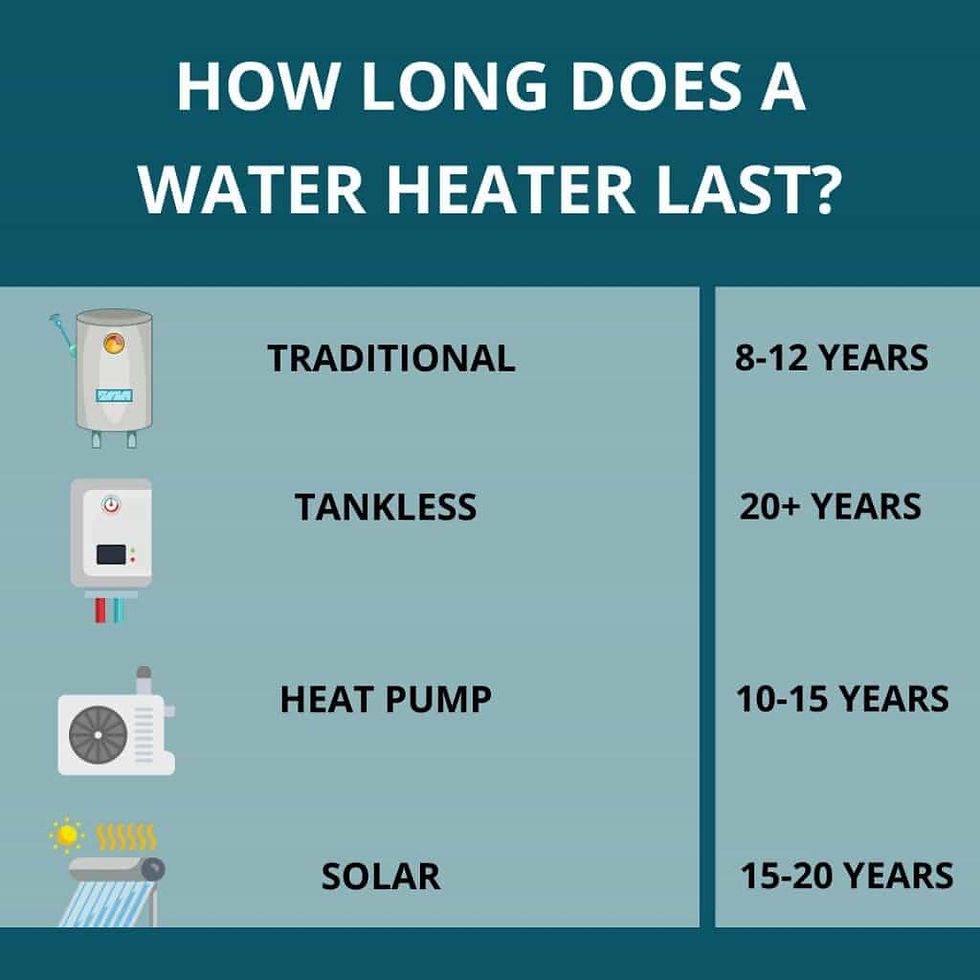Understanding the Lifespan of Water Heaters and Tips for Longevity
- forgachplumbing
- Jun 17, 2025
- 4 min read

Water heaters are crucial appliances in many homes. They provide hot water for bathing, cooking, and cleaning. However, like any household appliance, water heaters have a limited lifespan. Knowing how long a water heater typically lasts and what affects its durability can help homeowners make informed choices about maintenance and replacement. In this blog post, we’ll explore the average lifespan of water heaters, factors that influence their longevity, and practical tips to extend their life.
Average Lifespan of Water Heaters
The average lifespan of a water heater depends on several factors, including the type of heater, maintenance practices, and water quality. Generally, traditional tank water heaters last between 8 to 12 years, while tankless models can function effectively for 20 years or more.
For instance, research indicates that electric water heaters typically last around 12-15 years, while gas units often last about 8-12 years. This variation is partly due to the fewer components that can fail in electric heaters. However, no water heater lasts forever, and recognizing the early signs of wear can prevent unexpected failures.
Factors Influencing Water Heater Longevity
Understanding the various factors that impact a water heater's lifespan is crucial for homeowners. Here are some important elements to keep in mind:
1. Quality of the Unit
The quality of the water heater itself is vital. Higher-end units often come with better warranties, energy-efficient features, and advanced components designed for durability. Investing in a reliable brand can result in fewer breakdowns and better performance over time. For example, brands like Rheem and A.O. Smith are well-regarded for their durability and consistent performance.
2. Regular Maintenance
Consistent maintenance is key to extending the life of any appliance. For water heaters, this includes:
Flushing the tank annually to remove sediment build-up, which can impact heating efficiency.
Checking the anode rod, a vital component that helps prevent corrosion.
Inspecting the heating elements for wear.
Neglecting maintenance can lead to a reduced lifespan, sometimes cutting it short by up to 50%.
3. Water Quality
The quality of your water has a significant effect on your heater's health. Hard water contains minerals that contribute to corrosion and damage heating elements. In fact, homes with hard water may notice a decrease in water heater lifespan by approximately 10-15%. Installing a water softener can greatly reduce these issues and extend the life of your water heater.
4. Temperature Settings
Setting the thermostat too high creates unnecessary stress on the unit. The recommended temperature setting is around 120°F. This not only helps to conserve energy but can also increase the lifespan of the heater, as a lower temperature reduces the risk of overheating.
5. Usage Patterns
The amount of hot water your household uses affects the lifespan of your water heater. A family that takes daily hot showers and runs multiple loads of laundry can wear out their system more quickly than others. For example, households using 80 gallons of hot water daily may find their heaters needing replacement every 8-10 years, compared to homes using only 30 gallons, which might extend their lifespan.
Signs Your Water Heater Needs Replacement
Identifying the signs that your water heater is failing can help avoid bigger problems down the road. Here are some common indicators:
1. Age of the Heater
If your water heater is older than 10 years and showing wear, it's crucial to consider a replacement. Many homeowners do not realize that even minor signs can signify a need for more immediate action.
2. Rusty Water
If your hot water has a rusty tint, this indicates corrosion inside the tank. This could lead to a complete failure, and immediate action is necessary.
3. Unusual Noises
Banging or popping noises suggest sediment buildup and could lead to overheating. Ignoring these sounds can result in a drastic decrease in efficiency or failure.
4. Leaks
Visible leaks around the base of the water heater are a clear sign that the unit may be compromised and requires immediate attention. Even small leaks can indicate serious problems.
Practical Strategies to Extend the Lifespan of Your Water Heater
By adopting proper care and maintenance practices, homeowners can extend their water heaters’ lifespans. Here are some effective strategies:
1. Regular Maintenance Checks
Schedule routine maintenance with a professional to ensure your water heater is functioning optimally. This can include annual inspections to check for wear and flushing the tank to prevent sediment buildup.
2. Install a Water Softener
Given the detrimental effects of hard water, installing a water softener can safeguard your heater. This system can potentially extend your water heater's lifespan, saving you on future repair costs.
3. Insulate the Heater
Insulating your water heater and pipes helps maintain temperature and reduces energy costs. It prevents overheating, contributing to a longer lifespan.
4. Adjust Temperature Settings
Lowering the thermostat to 120°F prevents overheating while still supplying adequately heated water for daily use.
5. Replace Anode Rod
The anode rod attracts corrosion materials and protects the tank from rust. It's smart to check and replace the anode rod every 3-5 years to maintain efficiency and prolong lifespan.
Final Thoughts
Knowing the lifespan of your water heater is essential for a functional and efficient home. On average, traditional water heaters last between 8 to 12 years, while tankless models can serve for 20 years or longer. By being proactive about maintenance and recognizing signs of wear, homeowners can take steps to enhance their water heaters' longevity and efficiency.
Incorporating solid practices such as regular maintenance checks, monitoring water quality, and making thoughtful adjustments can lead to significant benefits, including cost savings and enhanced efficiency. Investing time in caring for your water heater today will yield dividends in the future—preventing premature failure and the inconvenience of sudden hot water loss.




Comments